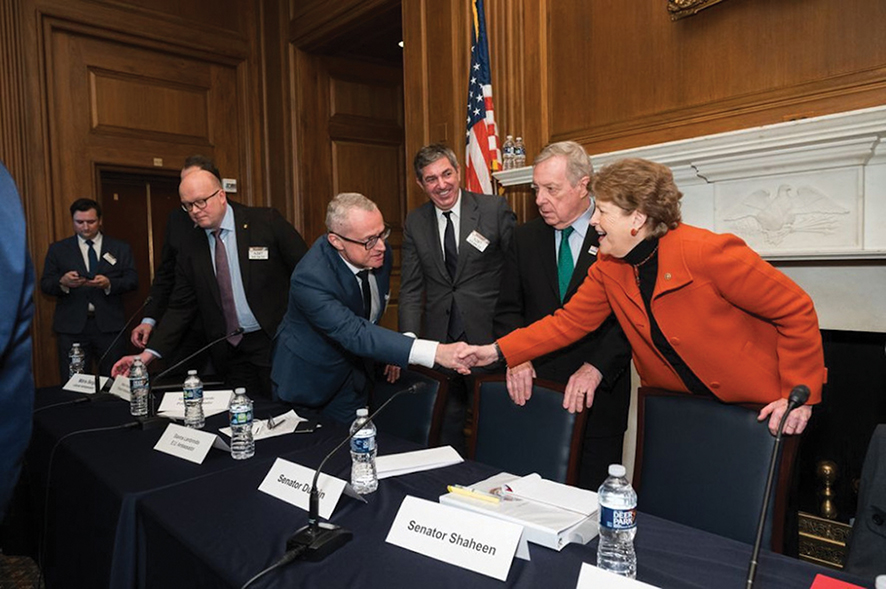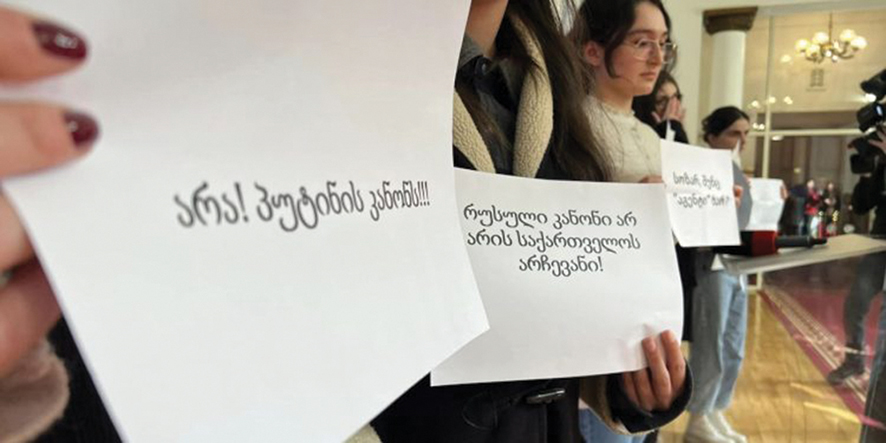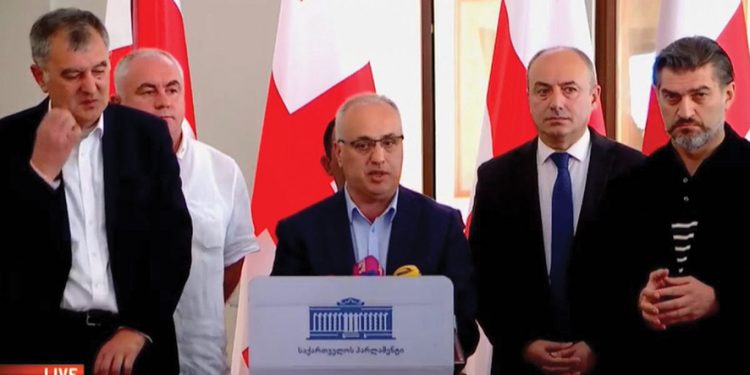Representatives of the “People’s Power” faction, formed by the deputies who left Georgian Dream but remained in the parliamentary majority, announced on 14 February that they had drafted a bill on the activities of foreign-funded organizations and would officially register it in parliament.
According to the draft law, “in order to ensure the transparency of foreign influence”, a register of agents of foreign influence will be created, where non-commercial legal entities and media outlets will be registered if more than 20% of their income is financed by foreign forces.
According to the draft law, the following are considered foreign powers:
• Agencies of foreign governments;
• Individuals who are not citizens of Georgia;
• Legal entities that are not established based on Georgian legislation;
• Organizations (including a foundation, association, company, union, etc.) or other associations of individuals established under the law of a foreign state and/or under international law.
The ruling party has agreed to support the bill, Mamuka Mdinaradze, Executive Secretary of Georgian Dream, announced this week, adding that discussion on the details will continue.
He claimed that if someone says that the draft law is similar to the Russian legislation, “he is simply lying”.
“Of course, the details will continue to be discussed. We should not forget that there were a thousand speculations relating to different countries, including the legislation of the occupying country, and I can say with full responsibility that whoever says that this is similar to Russian legislation is simply lying,” Mdinaradze said.

President Salome Zurabishvili responded to the draft law and said that she “cannot support such legislation and the prosecution of new agents”.
“This is a time when the initial evaluation of the implementation of the 12 recommendations of the European Commission is being prepared, when February 24 is close, for all three countries of the associated trio, making the question of their European future more and more urgent. And at this time one of Georgia’s political groups chooses to initiate a law which in content brings us closer to the vicious model of Russia, not Europe,” reads the statement published on the page of the presidential administration on February 20.
The statement also emphasized that the draft law was registered at the parliament’s bureau just when “a delegation of American senators had arrived in the country,” referring to the visit of Jean Shaheen and Dick Durbin to Georgia.
“We really cannot blame all this on coincidence. A force has been developed which, instead of strengthening Georgia’s European path, considers another path to be in Georgia’s interest,” the President stated.
US Senator and Chairman of the Senate Foreign Relations Subcommittee on European and Regional Security Cooperation Jean Shaheen, and Chairman of the Senate Group on Ukraine Dick Durbin, visited Georgia on February 21 to discuss the proposed law on “foreign agents”.
At a press conference, Shaheen asserted that the law has nothing to do with its American analogue, but is rather a copy of a similar Russian law. The same law was adopted by Hungary, but it was incompatible with EU standards and human rights, he claimed, adding that the issues of deoligarchization and the EU’s 12 points for candidacy were discussed at a meeting with Prime Minister of Georgia Irakli Garibashvili.
Shaheen also noted that it is extremely important for journalists to have the opportunity to work freely in their profession. According to the Senator, media freedom and human rights are among the main recommendations from the European Union, and Georgia must meet the challenge.
“For 30 years, the US has supported the aspiration of Georgia and the Georgian people to live in a democratic, prosperous and successful country, and they support the aspiration of Georgia to become a member of the European Union and NATO. And we confirmed this support at today’s meetings.
“We also recommended the government continue to support such issues as accountability, transparency, and promote the Georgian people’s desire for Euro-Atlantic integration and rapprochement with Europe,” Shaheen said.
Earlier, on February 16, the official representative of the US State Department, Ned Price, reacted to the initiative and declared that such a law would create a potential threat to the Euro-Atlantic movement of Georgia. According to Price, the law is based not on the American, but on the Russian and Hungarian versions of this legislative act.
According to Price, the proposed law will exclude and silence the independent voice of Georgian citizens who strive to create a better future for their society.
The Parliamentary Assembly of the Council of Europe also called on the political factions of the Parliament of Georgia not to support the draft law initiated by an anti-western political party.
“We call on all other political factions of Georgia – do not support this draft law. If adopted, it will have a devastating effect,” read the PACE statement on Twitter.
Transparency International also noted its alarm.

“If approved, the legislation will have a serious negative impact on the already shrinking space for civil society and independent media in the country. It would also undermine future progress against corruption in Georgia,” TI wrote in its statement.
Following the announcement of the initiative, journalists and NGOs immediately protested at the perceived threat to media freedom in Georgia.
“We, the people of Georgia, strongly oppose the bill initiated by the members of the Parliamentary Majority, also endorsed by the Speaker of Parliament and other MPs. We declare that the attempts to adopt this Russian bill attack not only independent civil society organizations and the critical media, but the people of Georgia themselves,” they said in joint a statement.
“This draft legislation acts as a response to the numerous facts of violence, corruption, lawlessness, and arbitrary execution of the laws that we, civil society and the critical media, study and make public,” they added.
“This bill aims to leave defenseless the abused children and women; people with disabilities, minorities, scientists, workers, and the youth; to not provide assistance to the socially vulnerable families, farmers, miners, internally displaced, homeless, illegally laid off, detained, and other people fighting for their rights; to mute the voice of the people living in the peripheries of the country that can only communicate their troubles through the independent media.
“When Putin adopted a similar law in Russia, many organizations chose to disband rather than comply with its requirements. Those that continued to operate faced increased control, harassment, and repressions. This is not the type of governance that we have fought for many years to achieve, and Russian law is certainly not the type of governance that Georgian citizens aspire to have in our country.
“Adopting this bill will amount to an attack on the key Georgian values of dignity, independence and solidarity with our communities and fellow people. Adopting this bill will amount to an onslaught not only against civil society and our democracy but will also damage our aspirations of Euro-Atlantic development. This law will obstruct our path to membership of the EU, as this law was found illegal in the EU. Moreover, the execution of this law will be impossible without causing insurmountable harm to hundreds of thousands of citizens of Georgia,” reads the statement.
The draft law on “agents of foreign influence” is often compared by critics to the law adopted in Russia in 2012, when Putin’s government created a “foreign agents” base for non-governmental organizations, and then targeted virtually anyone who did not follow the Kremlin’s rhetoric.
Despite such criticism and protest from both local media, NGOs and the western partners, the Georgian Dream party is still expected to support the bill and therefore increase the state’s control and pressure on the opposition-minded media and non-governmental sector.
By Ana Dumbadze














